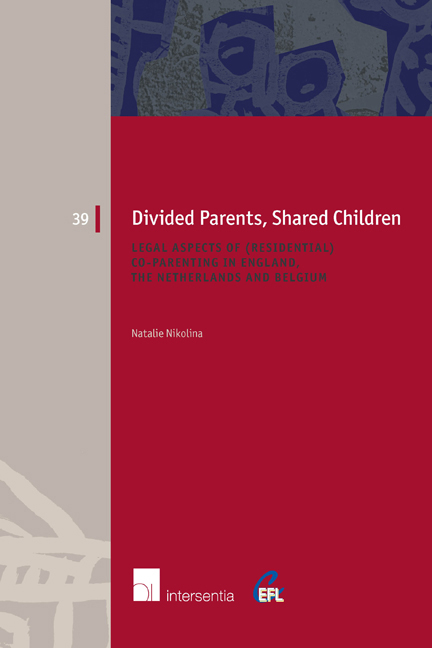 Divided Parents, Shared Children
Divided Parents, Shared Children Book contents
- Frontmatter
- Acknowledgements
- Contents
- Chapter 1 Introduction
- Chapter 2 International and European framework
- Chapter 3 The English legal system
- Chapter 4 The Dutch legal system
- Chapter 5 The Belgian legal system
- Chapter 6 Socio-psychological aspects of residential co-parenting
- Chapter 7 Comparative synthesis
- Chapter 8 Conclusions and recommendations
- References
- Samenvatting
- About the author
- European Family Law Series
Chapter 6 - Socio-psychological aspects of residential co-parenting
Published online by Cambridge University Press: 12 December 2017
- Frontmatter
- Acknowledgements
- Contents
- Chapter 1 Introduction
- Chapter 2 International and European framework
- Chapter 3 The English legal system
- Chapter 4 The Dutch legal system
- Chapter 5 The Belgian legal system
- Chapter 6 Socio-psychological aspects of residential co-parenting
- Chapter 7 Comparative synthesis
- Chapter 8 Conclusions and recommendations
- References
- Samenvatting
- About the author
- European Family Law Series
Summary
INTRODUCTION
This chapter compiles data on residential co-parenting from various empirical studies with a demographical, sociological, or psychological background. The goal is to present the law which is applicable to residential co-parenting and is discussed earlier in this book within its social framework. This is important because law in general, and family law specifically, does not operate in a vacuum. There exists an inevitable link between society and its law. The choice of parents or the court for a certain residential arrangement is not only influenced by legal considerations, but also – and perhaps primarily so – by the practical situation of the family, the general societal attitude towards different types of residential arrangements, the financial circumstances and the emotional relationship between all the parties involved.
It is impossible to address all of these factors in an in-depth, comprehensive manner within the confines of this book. Therefore, this chapter will be limited to answering two questions which have a direct influence on residential co-parenting legislation: does residential co-parenting occur in the three countries discussed, and if so, how predominant is it? And should residential co-parenting be stimulated or discouraged?
First, it must be examined whether residential co-parenting is an arrangement that is actually practised by separated parents and is not only an option that exists in theory. In order to do this, statistical information from the national systems is consulted and displayed to show the prevalence of residential co-parenting in each of the three countries whose legislation is presented in this book.
The second step is to investigate whether having legislation in place influences or has the potential to influence the choice of residential arrangement. Even if certain residential arrangements exist, the necessity of enacting legislation that regulates these arrangements should be questioned if evidence exists that the availability of legislation has no effect on the number of parents choosing a certain arrangement or courts ordering certain arrangements. Therefore, where this information is available, this chapter compares the numbers of parents who had residential co‑parenting arrangements before special legislation thereon was enacted and the numbers of parents who have such arrangements afterwards.
- Type
- Chapter
- Information
- Divided Parents, Shared ChildrenLegal Aspects of (Residential) Co-Parenting in England, the Netherlands and Belgium, pp. 157 - 192Publisher: IntersentiaPrint publication year: 2015


